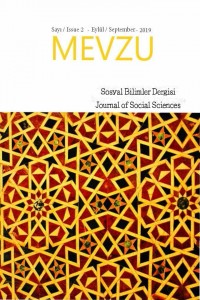Abstract
Öz
İmam
hatipler toplum adına çok önemli bir görev ifa etmektedirler. Günümüzde bu
görevin başarılı bir şekilde yürütülmesi için lise seviyesinde bir eğitime
sahip olmak ve sadece geleneksel yöntemleri kullanmak yeterli değildir. Bundan
dolayı imam hatiplerin görevlerini başarıyla yapabilmeleri ve toplumda var olan
saygınlıklarını sürdürebilmeleri için dini ilimlerde yeterli ve toplum
ortalamasının üstünde bir kültüre sahip olmaları zorunluluk arz etmektedir. Bu
kapsamda en çok lazım olan dini ilimlerden birisi de hadis ilmidir. Son
yıllarda medya yoluyla hadislere yönelik yapılan olumsuz propagandalar imam
hatiplerin hadis ilmi konusunda daha donanımlı olmalarını gerekli kılmaktadır.
Çünkü hadisler Hz. Peygamber’in sünnetlerini bize aktaran vesikalardır. Hadisleri
reddetmek aynı zamanda on dört asırdır kabul edilip yaşanan sünnetleri de
reddetmek anlamına gelmektedir.
İmam
hatiplerin hedef kitlesi olan toplum fertleri günümüzde bilgiye kolay ulaşmakta
ve duydukları her şeyi sorgulamaktadırlar. Özellikle orta yaş ve altı, her
konuda olduğu gibi dini konularda da daha akılcı düşünmekte ve bilimsel izahlar
beklemektedirler. Bir kitaptan sadece okumak suretiyle aktarılan bilgiler bu
kesimi yeterince ikna etmemektedir. İmam hatiplerin en üst seviyede eğitim
almaları, bilgi ve kültür yönünden hedef kitleyi tatmin edecek düzeyde
bulunmaları, projeleri ve faaliyetleriyle topluma cami dışında da liderlik
yapmaları hedef kitlenin beklentilerinin karşılanması açısından son derece
önemlidir.
Bu
makalede imam hatiplerin hadis ve sünnet konusundaki bilgi ve algıları,
eksikleri ve beklentileri Uşak ilinde görevli 135 imam hatibe uygulanan anket
cevaplarına göre tespit edilmeye çalışılmıştır.
Anahtar
kelimeler: İmam hatip, Eğitim, Vahiy, Hadis, Sünnet, Hadis dersi, Hutbe.
Absract
The imam orators perform a very important task
for society. Today, it is not enough to have a high school level education and
to use only traditional methods in order to carry out this task successfully.
For this reason, it is imperative for the imams to have sufficient culture in
religious sciences and have a culture above the average of society in order for
them to perform their duties successfully and maintain their dignity in
society. In this context, one of the most necessary religious sciences is the
science of hadith. In recent years, the negative propaganda made against the
hadiths through the media necessitates that the imam hatipers should be better
equipped in the field of hadith science. Because the hadith of Hz. Muhammed are
the documents that convey the Sunnah of the our Prophet to us. Rejecting the
hadiths also means rejecting the circumcisions that have been accepted for
fourteen centuries. Today, community members, who are the target audience of
imam orators, have easy Access to information and question everything they
hear. They think more rationally and expect scientific explanations, especially
in the middle age and under religious issues. Information transferred from a
book by reading only does not convince this segment sufficiently. It is
extremely important for imam orators to receive education at the highest level,
to satisfy the target audience in terms of knowledge and culture, and to lead
the society outside the mosque with their projects and activities in order to
meet the expectations of the target audience. In this article, information and
perceptions of imam orators about hadiths and sunnah, deficiencies and
expectations were tried to be determined according to the survey answers
applied to 135 imam hatip in charge of Uşak province.
Key words: Imam hatip, Education, Revelation, Hadith, Sunnah, Hadith lesson,
Sermon.
Keywords
References
- Ay, Yusuf, (2008). Diyanet İsleri Başkanlığı’nın Yayımladığı Hutbelerdeki Hadislerin Tahrîci ve Genel Değerlendirmesi (2001-2004), Ankara: (yüksek lisans tezi).
- Babanzâde Ahmed Nâim Efendi, (1982). Sahîh-i Buhârî Muhrasarı Tecrîd-i Sarîh Tercemesi ve Şerhi, Ankara: Diyanet İşleri Başkanlığı Yayınları.
- Bilen, Mehmet, (2005). Din Görevlilerinin Hadis Bilgisi, Ankara: Semih Ofset.
- Kâsımî, Muhammed Cemâlüddîn, (1433/2012). Kavâidü’t-tahdîs min funûni mustalahi’l-hadîs, thk. Mustafâ Şeyh Mustafâ, Beyrut: Müessesetü’r-risâle nâşirûn.
- Sakallı, Talat, (1995). Sünnetin Bağlayıcılık Açısından Taksimi, Süleyman Demirel Üniversitesi İlahiyat Fakültesi Dergisi, Sayı 37, s. 39-102.
- Şahiner, Mevlüt, (2012). “Camilerde Hutbe ve Diyanet İşleri Başkanlığı Kayseri İl Müftülüğü Hutbelerinde Kullanılan Hadislerin Tahriç ve Tahlili (2006-2010)”, Kayseri: (yüksek lisans tezi).
Details
| Primary Language | Turkish |
|---|---|
| Journal Section | Articles |
| Authors | |
| Publication Date | September 30, 2019 |
| Submission Date | August 13, 2019 |
| Acceptance Date | September 26, 2019 |
| Published in Issue | Year 2019 Issue: 2 |
Mevzu – Journal of Social Sciences is licensed under a Creative Commons Attribution-NonCommercial 4.0 International License (CC BY NC).
SHERPA ROMEO | LOCKSS | Crossref Participation Report | DOI | OAI

